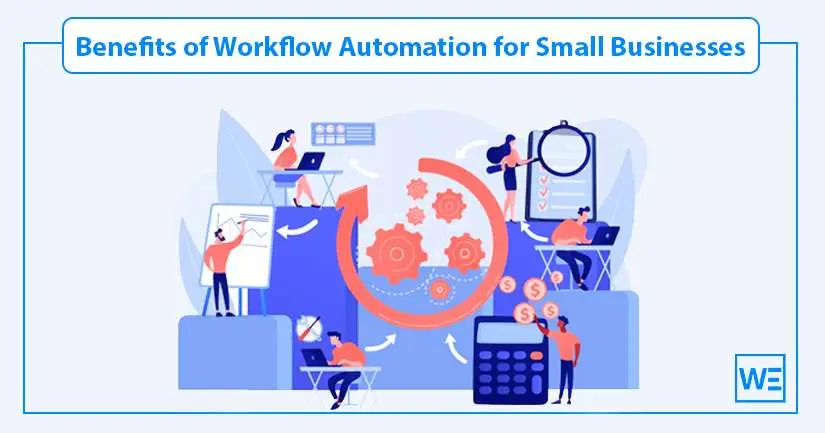10 Benefits of Workflow Automation for Small Businesses

It should not come out as a surprise that most business leaders in the present time are avidly interested in workflow automation. There are many benefits of workflow automation. It speeds up the workflow, reduces labour costs, and also increases the scalability of workflow.
For instance, signing documents has been an everyday business activity. From finalizing official contracts, and welcoming customers, to issuing a product or service, paper documents have been used forever. The truth is that they cost a lot and they are also inefficient. A solution to this problem is creating an online signature.
The use of free electronic signature software helps in facilitating users to validate documents by signing them digitally. The users can sign documents quickly while facing the hurdles of manual signatures including in-person meetings and travelling.

Supplement Your Remote Working and Go Paperless With E-Signature Adoption
WeSignature is an electronic signature service for small businesses that enables quick, productive, cost-effective, and legally compliant document signing process. Adopt this solution today and transform your business completely.
Using the e-signature service makes workflow automation simple. You can easily automate processes in an organization while solving the problems that come with manual work. To get a better context, let us understand what workflow automation is.
What is Workflow Automation?
Workflow automation is the process of automating processes within an organization for solving the problems that otherwise come with manual work. Automation can be implemented at many different stages of work as it helps in speeding up processes, cutting back labour costs, and preventing all problems.
Workflow automation includes the planning and implementation of independent workflows for everyday tasks. It is essentially applied for validating information so that mistakes can be prevented when you go down the line.
Benefits of workflow automation can be extended to automatic routing by carrying out all tasks in an automatic way. Automatic record-keeping is an extremely helpful way of solving everything. The records can be kept up to date which also helps in automatically uploading the workflow documentation directly to the filing system.
In this blog, we will list down 10 powerful benefits of workflow automation for small businesses. Keep reading to know more.
1. Improved Accuracy
While using paper-based documents, many stakeholders often end up ignoring the process of filling in important information. They either skip the pages or end up ignoring the columns.
Thus, paper-based documents result in a delay in completing the documentation process. Using the alerts and highlights, workflow automation for small businesses ensures that there should be no scope for missing out on information so that the accuracy of a process improves.
2. Better Security
Creating an online signature is a kind of workflow automation that allows businesses to secure their sensitive and confidential information. The configuration of security parameters on documents allows easy access to users who are important to the process.
Other than this, the e-sign workflow automation for small business keeps the documents safe from malicious acts since the algorithm allows limited access. Workflow automation brings in safety that prevents any kind of malicious access to documents. The e-sign workflows deliver better security over paper-based documents.
3. Multi-Platform Integration
All across the world, businesses are adopting digital solutions including CRM and ERP platforms for improving productivity. For this reason, many managers spend more time on these platforms.
The thing with e-sign workflows can be easily integrated into the platforms while allowing signatories to sign documents from the platform. This saves time and resources.
4. Better ROI
While signing, paper based documents need all the parties involved to be there in person. This also means scheduling meetings and going to see the business offices or the customer’s homes.
The signing process can be expensive and even time consuming oftentimes. On the other hand, the workflow automation brought in by esign workflow automation for businesses helps to sign documents in a comfortable manner. In addition, the benefits of high accuracy, low storage costs, and better security allow the business to adopt e-sign workflows.
5. No Processing Errors
Manual processing is often full of errors. In a professional setting, the staff members can also end up making mistakes when they enter data into the systems. These errors do not just delay processing but they also lead to compliance issues.
If the errors go unnoticed, there are poor outcomes by the end of the process. Workflow automation can solve this problem by reducing any manual errors. Automated workflows lead to better product quality.
6. Better Customer Experience
At present, many companies are trying to improve their workflow with the benefits of workflow automation. The benefits improve customer satisfaction and also help to stay competitive in the market
Any unhappy customers do not return for repeat business. The automated workflow leads to few errors and delays but the truth is that products and services get easily delivered on time and that too correctly.
Not just this, automation also helps in optimizing the processing time just so that the tasks in the workflow become less complex. The result is always a better customer experience.
7. Better Workflow Stability
The only way to scale up manual processes is by hiring people or increasing every person’s workload. However, when the manual processes are scaled up, there is a need to deal with an increase in errors.
The workflow automation for small business makes scaling up a business very easy. The repetitive tasks can occur all at once which also means that no human labour is required. There are better efficiency levels and it becomes easy to increase the output of systems without incurring jumps in staffing costs.
8. Improved Accountability
When the workflow is automated, it becomes easy to assign responsibility to a team member for all parts of the process. This reduces any possibility of something getting slipped into the gaps.
Every single step of the process can be assigned to someone. In addition to ensuring that all the work gets done, this also helps in revealing any possible inefficiency in the working process. This is one of the best benefits of workflow automation.
9. Empowered Workforce
Workflow automation for small businesses also enables employees to feel empowered. Their role in the process and the tasks they feel responsible for can be managed a lot more effectively.
It is also easy to take better accountability for everything that can go wrong. The managers no longer have to oversee each step of the process or even check in on the employees.
10. High-Quality Work
One of the best benefits of workflow automation is that the employees can do high-quality work after it gets implemented within an organization. Since all the processes become automatic, there is more time to do work they should be cared about.
The software handles boring and error-prone tasks and you are bound to see better quality from the team. When there is high-quality work delivered, the organizational goals are met easily and that too in a relatively short span of time.
Conclusion
All small businesses must make the most out of the benefits of workflow automation. It helps in speeding up the process and cuts back on all labour costs. You can also see an uplift in customer satisfaction and more opportunities for scaling them up.
By installing workflow automation software such as an e-signature solution like WeSignature, small businesses can get quick signatures, speed up the approval process, and improve workflow efficiency as well.
FAQs – Small Business Workflow Automation Benefits
1. What are the benefits of workflow automation?
Workflow automation improves productivity, reduces errors, ensures consistency, and speeds up processing times. Automation frees employees to focus on higher-value tasks, increasing efficiency and output.
2. Which industries can benefit from workflow automation?
Workflow automation benefits healthcare, finance, manufacturing, and retail, as well as any industry that relies on repetitive tasks and processes.
3. What is workflow automation and why is it beneficial for small businesses?
Workflow automation uses technology to simplify and streamline business processes, resulting in increased efficiency, accuracy, and cost savings. It allows small business owners to focus on more strategic activities and scale their operations as the business grows.
4. What are some examples of workflow automation for small businesses?
Examples of workflow automation for small businesses include automating data entry, email communication, social media scheduling, appointment scheduling, and inventory management. These processes can help small businesses save time, reduce costs, and improve their overall operations.
5. How do I identify which processes in my business need to be automated?
Look for repetitive, time-consuming tasks that are prone to human error or require manual data entry. These are the processes that can benefit most from workflow automation for small businesses.
6. What tools can small businesses use for workflow automation?
Popular tools for small business workflow automation include WeSignature, Zapier, IFTTT, and Microsoft Power Automate. These tools allow you to automate tasks across multiple platforms and applications.
7. What challenges might small businesses face when implementing workflow automation?
Resistance from employees and the need for training and support are common challenges when implementing workflow automation for small businesses.
8. Can workflow automation improve customer service for small businesses?
Yes, workflow automation for small businesses can improve customer service by streamlining communication and automating tasks such as appointment scheduling, order tracking, and follow-up surveys.
